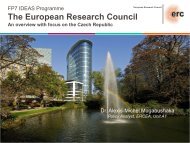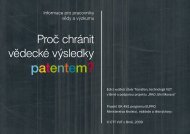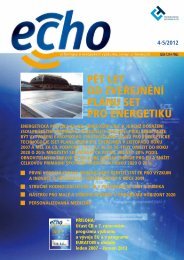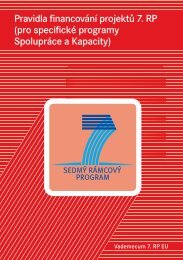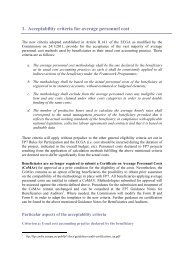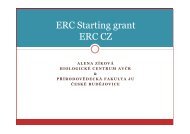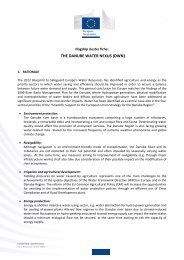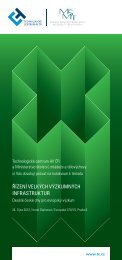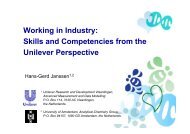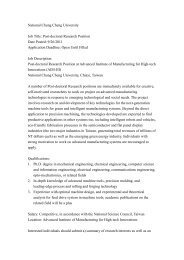Guide to Research and Innovation Strategies for Smart Specialisation
Guide to Research and Innovation Strategies for Smart Specialisation
Guide to Research and Innovation Strategies for Smart Specialisation
You also want an ePaper? Increase the reach of your titles
YUMPU automatically turns print PDFs into web optimized ePapers that Google loves.
Digital Agenda <strong>for</strong> Europe<br />
Why should the Digital Agenda be part of smart specialisation?<br />
In<strong>for</strong>mation <strong>and</strong> communication technologies (ICT) are a powerful driver <strong>for</strong> economic<br />
growth, innovation <strong>and</strong> increase in productivity. Data from the 2010 Digital Competitiveness<br />
report 77 reveals that while representing 5 % of GDP, ICT drives 20 % of overall productivity<br />
growth <strong>and</strong> that the ICT industry has a 25 % share in <strong>to</strong>tal business R&D. The Europe 2020<br />
strategy has recognised the enormous potential of ICT <strong>and</strong> made the Digital Agenda <strong>for</strong><br />
Europe 78 (DAE) one of its seven flagships. Its aim is <strong>to</strong> deliver smart, sustainable <strong>and</strong><br />
inclusive economic growth through the realisation of the digital single market <strong>and</strong> the<br />
exploitation of the potential <strong>for</strong> innovation of fast <strong>and</strong> ultra fast internet <strong>and</strong> interoperable<br />
services <strong>and</strong> applications.<br />
DAE has set ambitious targets <strong>for</strong> high speed internet infrastructure across the Union (by<br />
2020: 100 % coverage of EU households at 30 Mbps minimum + 50 % take-up<br />
(subscriptions) at 100 Mbps minimum) <strong>and</strong> <strong>for</strong> wide deployment <strong>and</strong> more effective use of<br />
digital technologies, applications <strong>and</strong> services.<br />
Successful delivery of this Agenda will enable Europe <strong>to</strong> deliver better quality of life through,<br />
<strong>for</strong> example, better health care (eHealth Action Plan, Active <strong>and</strong> healthy ageing Partnership),<br />
social inclusion <strong>and</strong> education (eInclusion, eSkills, eLearning), a more effective public<br />
administrations (eGovernment Action plan, eProcurement, eJustice) <strong>and</strong> dialogue between<br />
citizens <strong>and</strong> decision-makers (eParticipation), safer <strong>and</strong> more efficient transport solutions<br />
(Intelligent Transport Systems, eCall), cleaner environment <strong>and</strong> more efficient energy<br />
networks (smart grids, smart metering), inter-modal <strong>and</strong> sustainable cities (smart cities), new<br />
media opportunities <strong>and</strong> easier access <strong>to</strong> cultural contents (eBooks, online plat<strong>for</strong>ms <strong>for</strong> music<br />
<strong>and</strong> movies, digitisation <strong>and</strong> access <strong>to</strong> Europe's cultural heritage 79 ). The deployment of a<br />
culture of open data <strong>and</strong> secured online access, the harnessing of a true digital single market<br />
(eCommerce), <strong>to</strong>gether with af<strong>for</strong>dable high speed internet infrastructure, are essential<br />
components of these ambitious goals.<br />
Whether your region is struggling <strong>to</strong> provide medical <strong>and</strong> social care in times of austerity or<br />
trying <strong>to</strong> create the conditions <strong>to</strong> attract new investment – the smart specialisation strategy<br />
building on or constitute the first step <strong>to</strong>wards local/regional "digital agenda": it provides a<br />
better underst<strong>and</strong>ing <strong>and</strong> best leverages the potential of digital technologies <strong>and</strong> services <strong>to</strong><br />
meet <strong>to</strong>day's challenges <strong>and</strong> prepare <strong>for</strong> <strong>to</strong>morrow's opportunities. The long term<br />
competitiveness <strong>and</strong> innovation potentials of regional <strong>and</strong> rural areas <strong>and</strong> the ability <strong>to</strong><br />
achieve the fundamental objectives of both regional <strong>and</strong> rural policies depend on good<br />
planning of these investments. This is as much a socio-economic as a cultural as well as a<br />
political challenge which management authorities of EU funds cannot af<strong>for</strong>d <strong>to</strong> miss.<br />
The reviewing of the initial Digital Agenda Communication will redefine <strong>and</strong> update<br />
priorities based on the current financial conditions <strong>and</strong> will remove actions which have<br />
already been complete or become obsolete.<br />
77<br />
See Digital Competitiveness Report 2010: http://ec.europa.eu/in<strong>for</strong>mation_society/digitalagenda/documents/edcr.pdf<br />
78<br />
http://ec.europa.eu/in<strong>for</strong>mation_society/digital-agenda/publications/index_en.htm<br />
79 www.europeana.eu<br />
81



